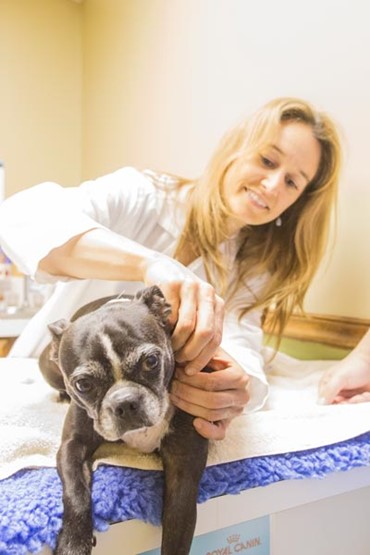Senior Pet Care

Over the course of your pet's life, he or she will age much faster than you, and be considered a senior by roughly 7 years of age. Much like you, your pet's aging will bring changes to his or her healthcare needs. Carefully monitoring and adjusting your senior pet care routine is the most effective way to stay connected to your pet's needs as they change, ensuring a lasting, comfortable and healthy life.
At Hope Springs, we take caring for your senior dog or cat seriously, and we make it our business to get to know and understand your individual pet's medical, nutritional, exercise and general lifestyle needs as they grow and change. Committed to understanding the subtle nuances of the aging process in pets, we closely monitor your unique pet's life stages through regular wellness examinations and interactions with our expert veterinary team. In caring for your senior cat or dog, we encourage you to schedule routine bloodwork and diagnostic testing to determine whether adjustments need to be made to your pet's diet, medical treatment and lifestyle. Our goal is to stay best aligned with your pet's needs, ensuring quality of life for your pet, and peace of mind for you.
Older dogs and older cats are loving and wonderful companions, and they deserve the highest level of care possible. Sustain your pet's health, wellness and happiness by remaining a close and connected observer of their changing needs.
Tips to Keep Your Senior Pet Healthy
- Visit your veterinarian at least twice a year for a comprehensive wellness exam.
- Schedule annual labwork for your pet to help detect changes early that may indicate illness or disease.
- Ensure proper nutrition as caloric intake and dietary needs may change as your pet ages.
- Have your doctor schedule radiographs to help detect areas of concern (i.e. chest radiographs can help detect changes in the heart, abdominal radiographs can help detect organ enlargement or the prescence of masses, pelvic and spinal radiographs help detect osteoarthritis and other concerns which may impact your pet's mobility)
- Ensure appropriate exercise to assist your pet in staying active
- Schedule oral health care and professional dental cleaning when indicated by your veterinarian to prevent the spread of harmful bacteria to organs and promote patient comfort.
- Continue vaccination program as recommended by your veterinarian based on risk assessment.
- Continue preventative medication year round for heartworm, intestinal parasites, flea and tick protection as indicated by your veterinarian.
- As your pet ages, there may need to be some changes to their home environment and daily schedule (i.e. ramps to help avoid stairs, flat entrance litter boxes, throw rugs to assist with traction on tile or hard wood floors)
Changes to Watch for as Your Pet Ages
- Loss of appetite
- Chronic bad breath
- Tartar and plaque buildup
- Excessive drooling and salivation
- Difficulty rising or using stairs
- Dry, flaky skin
- Changes in urination or defecation
- Excessive scratching, licking and chewing
- Weight loss in addition to frequent hunger
- Intolerance to cold and exercise
- Change in coat or hair loss
- Overly tired or easily tired with no change in exercise
- Shaking and/or trembling
- Excessive panting
- Acting "lost"
- Appearing disoriented or confused
Ask us today about how we can help your pet enjoy every moment of their "golden years"!
We want to help you stay well informed about preventive pet health care. Explore our pet health resources and advice below to learn more.










